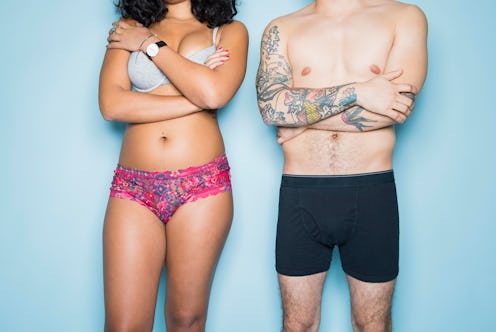
The CDC has come under fire recently for a slew of misogynistic, woman-geared STD-prevention recommendations which completely ignore the complicity of heterosexual men in spreading sexually transmitted diseases. Now, they're evidently surprised by the natural consequences of letting dudes off the hook: the CDC is reporting that a shocking majority of boys are not getting the HPV vaccine, and vaccine uptake among boys is significantly lower than it is among girls.
The HPV vaccine, commonly known as Gardasil, is supposed to be recommended by pediatricians for children at age 11 or 12, whereupon it gets administered in three doses over a few months. While most sexually active folks will contract harmless strains of HPV in their sex-having lifetimes, a few strains do cause cancers in men and women. The vaccine is meant to help guard against those particularly virulent strains and against genital warts — and it's working! HPV rates among girls are down 64 percent. But boys are missing out.
In the CDC's study of HPV vaccines administered in 2015 — almost a decade after the vaccine's initial release — they found that 60 percent of girls aged 13-17 got the first dose in the series, while only 39.7 percent of boys the same age got it. Less than 13 percent of boys complete the full series.
"For comparison's sake, there are two other unrelated vaccines that kids are supposed to get at the same doctor's visit, and the CDC found that 79.3 percent and 89.6 percent of boys got those."
There are a few different reasons the CDC surmises parents are failing to protect their male children from the virus. First of all, people don't really know that boys are supposed to get the vaccine. People hear "Gardasil" and think "cervical cancer." And while it's true that HPV has more detrimental effects on women, men are still carriers of the virus, and are still susceptible to certain cancers themselves (though at much lower rates). It shouldn't be up to women alone to protect themselves in the face of a public health crisis. Men have a duty to be ethical sex partners, too.
Then there's the fact that the recommended age of vaccination makes parents and pediatricians skittish. Folks are so uncomfortable discussing protecting a child against sexually transmitted diseases that they avoid the conversation altogether, even though 11-to-12-year-olds could plausibly be pubescent and definitely need resources in place to have responsible sex later, if they so choose.
Finally, many parents are still afraid of the age-old myth that protecting their children against things like STDs, pregnancy, and other consequences of sex, by giving them an HPV vaccine, putting them on birth control, or putting them on PrEP, will somehow encourage them to engage in "promiscuity," or what the patriarchy likes to call "risky sex." But the HPV vaccine, birth control, and PrEP are all designed to mitigate the risks of sex. Plus, studies have already debunked that myth. Research published in the Canadian Medical Association Journal found that, between girls who are vaccinated against HPV and those who aren't, pregnancies and STD rates were the same.
It's massively unfair for parents and pediatricians to punish a whole generation of women with a public health crisis just because they're uncomfortable discussing ethical sex with their young boys. And it's even worse to reinforce the idea to those boys that, if a disease doesn't affect them, but they have a hand in spreading it, then it's not their responsibility to do anything about it. Adults get flu shots to protect children, the elderly, and others with compromised immune systems, even though the flu isn't deadly to most adults. Heterosexual men (and the parents of boys) share that same responsibility in preventing the spread of HPV.
Want more of Bustle's Sex and Relationships coverage? Check out our new podcast, I Want It That Way, which delves into the difficult and downright dirty parts of a relationship, and find more on our Soundcloud page.
Images: Andrew Zaeh/Bustle; Giphy (2)